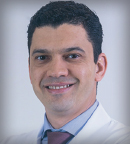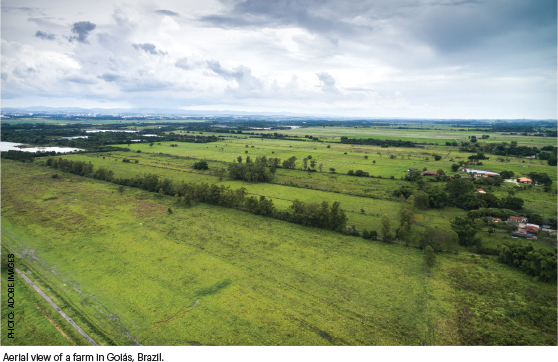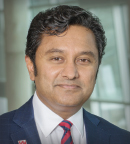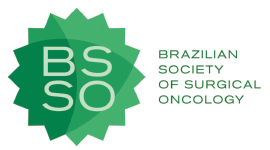In this installment of The ASCO Post’s Global Oncology series, Guest Editor Chandrakanth Are, MBBS, MBA, FRCS, FACS, the Jerald L. & Carolynn J. Varner Professor of Surgical Oncology & Global Health at the University of Nebraska Medical Center, Omaha, spoke with Héber Salvador, MD, PhD, President of the Brazilian Society of Surgical Oncology.

Héber Salvador, MD, PhD
Dr. Salvador was born and reared in Goiás, located in the Center-West region of Brazil. “I’m the son of a farmer and a kindergarten teacher and the youngest of five siblings. I was the first in my family to go to medical school, but all my brothers and sisters went to the university and became professionals,” he related.
“In Brazil, we have a different system of training than in the United States,” he added. “When I finished high school, I was torn between going to medical school or veterinary school; in the end, I was approved in both entrance exams and selected medicine. Although it’s hard to decide a career path at the tender age of 16, I’m pretty sure I made the right decision.”
“It takes 6 years to graduate in medicine in Brazil,” he added. “I finished the medical course when I was 21 and then served in the army, which is mandatory in Brazil when you reach 18. I was already in the university at the time, and the military postponed my service until I finished medical school.”

Dr. Salvador continued: “I graduated from the Federal University of Uberlandia medical school in 2001. Following my military service, I started my training in general surgery and trauma, which I finished 3 years later. I then moved to Sao Paulo and started my training in surgical oncology. It was also a 3-year training program at A.C. Camargo Cancer Center, which is the hospital I joined when I finished my residency and where I still work at the Upper GI and the HPB Surgical Oncology Department. A member of the Brazilian Society of Surgical Oncology (BSSO) Board of Directors since 2016, I have served in many positions until becoming President of the Society in 2021, a position I hold to this day.”
Asked about his decision to enter the challenging field of oncology, Dr. Salvador explained: “I’ve always been intrigued by the extremely well-controlled mechanisms of the cell cycle. When I first had contact with patients with cancer during my training, it had a profound impact on me. After I finished my third year of medical school, it became clear to me that cancer was one of the main threats to human health. I was intrigued by the way your own body stops recognizing the natural systemic order and begins to proliferate malignant cells that evade your immune system. Also, cancer was a huge medical problem filled with challenges and opportunity. But, at the same time, I was captivated by the way surgery could help people in a direct way. So, I decided to combine both strategies, and that is how I became a surgical oncologist.”
Prevalence of Cancer in Brazil
In Brazil, access to cancer treatment and early diagnosis has increased since the early 2000s. Many governmental and nongovernmental efforts, such as increased cervical, breast, and prostate cancer screening, have led to diagnosing these cancers earlier, when treatment is likely to be more effective. However, access to these services is still insufficient for some of the population, and new technologies that increase cure rates and improve quality of life are limited or unavailable in the public health system. Most people in the country—about 75%—access their cancer care in the public, universal health system. The remainder of the population have private health insurance.
According to Dr. Salvador, the prevalence of cancer in Brazil reflects similar patterns as in other middle-income countries. “We are living a demographic transition; more people are getting older, and, unfortunately, aging doesn’t come with the guarantee of health-care access to everyone. We are facing a tough problem in terms of guaranteed access to health care for our aging population,” he commented.
Dr. Salvador continued: “We are facing an increase in cancer incidence in Brazil, and this increase is affecting different areas in different ways. If you take our official statistics, and probably those numbers are underestimated, we are expecting around an 8% increase in the total number of cancer cases every year for the next 3 years. Considering our predictions to 2025, it means we will have more than 700,000 new cases per year, and cancer is quickly becoming the most common cause of death in many Brazilian cities. The most common tumors in Brazil, excluding nonmelanoma skin cancer, in men are prostate, colorectal, and lung, respectively. And for women, they are breast, colorectal, and cervical cancers. We have pretty much the same incidence and mortality of high-income countries, but we also have the challenges faced by low-income nations, such as poor coverage of human papillomavirus vaccines and cervical cancer screening.”

Economic Challenges: Cost of Care and Lack of Local Research
Asked to compare Brazil, which is the largest and most culturally diverse country in South America, with other countries in the continent, Dr. Salvador, remarked: “All countries in the region face economic challenges with different rates of people living below the poverty lines, and most people rely on the public health system for their care. We’re also seeing an increase in the costs of health-care delivery. That’s a common issue for all countries in the region.”
“Another problem is a lack of local research. Much of the research progress we have in health care comes from other countries. However, in Brazil we also have access to cutting-edge technology resources, including more than 100 robotic platforms, chimeric antigen receptor (CAR) T-cell therapies, and state-of-the-art radiotherapy. This is a part of our contradictions; in the same country, we have all the challenges faced in each country in the Latin America region and also all the modern high-tech resources needed to treat patients with cancer. It is a paradox, but we are working to level the field, so we can provide high-value care across the board.”
A Law Seeks to Bring Equity to Care
According to Brazilian law, patients with cancer have 60 days after diagnosis to begin treatment at the United Health System (better known as SUS [Sistema Único de Saúde]). The law was decreed by the federal government in 2012 to address long delays between diagnosis and treatment. According to Dr. Salvador, the law has, for the most part, had positive effects on the Brazilian cancer care system.
“It was a good way to think about reducing the inequity in terms of access to cancer care and making the reality more comparable between people who have access to a private health system and those who are treated in the public health system,” Dr. Salvador explained. “This law established that from the diagnosis of cancer to the beginning of treatment, there should be a maximum interval of 60 days for every patient. Once the diagnosis is suspected, we have another law that established any exam necessary to confirm or exclude this suspicion should be available within 30 days. But both laws are not completely followed. We pursued that, but then we had the COVID-19 pandemic, and all the resources and attention were focused on that.”
“Right now, this is not the reality for people who are having their cancer treated in the Brazilian public health system,” he acknowledged. “Sometimes, it takes months to get a biopsy report, and then you have to be referred to an oncology unit, since cancer centers are scarce. There are some hospitals dedicated to cancer treatment in the public health system, but few of them are fully dedicated to it. I work at the first cancer center established in Brazil in accordance with the idea of integration of all the steps of the patient’s journey during their cancer treatment, but unfortunately it is not the common ground. Most people will receive their treatment in general hospitals, and at this time, they don’t have the ability to start any treatment in 30 or 60 days.”
Brazilian Progress Report
From his perspective as a leader in surgical oncology, Dr. Salvador noted significant changes that occurred over the arc of his career. “When I started my surgical oncology training, virtually all patients diagnosed with stage 4 melanoma, for example, died within 1 year, and now roughly one-third of them can be cured. There has been tremendous evolution in terms of systemic treatment, technology advances, and surgery, which became less invasive and more effective,” he said.
Dr. Salvador continued: “When I talked to my mentors, they told me it took 30 years to experience the same evolution we have seen in the past 5 years. That’s amazing. For instance, we used to treat cancer without any knowledge of the molecular mechanisms behind its origin. Now, we can get more and more information and have access to immunotherapy with mRNA vaccines, for example. It is a very interesting time. And finally, artificial intelligence will change the way we select treatment options over the next few years. It has been an amazing journey.”
Inequities Based on Income
Dr. Salvador commented on the subject of diversity and inequities: “The ethnicity in populations is important, but I think inequities in care are more deeply related to economic disparities. Why, for example, are Black and Indigenous peoples at higher risk of not receiving adequate cancer care in Brazil? The reason is they are the poorest population and have less access to technology and screening resources. And that’s why it makes it even harder to guarantee surgical oncology care for those patients. Inequity has been a challenge to deliver cancer care in Brazil. People from rural areas, Black people, and Indigenous people need public health system policies to gain access to modern treatment options. We have made some progress on that, but more is needed.”
GUEST EDITOR

Chandrakanth Are, MBBS, MBA, FRCS, FACS
National Cancer Registry
Dr. Are noted that a common problem among many middle-income countries is a lack of cohesive cancer data collection and dissemination. According to Dr. Salvador, Brazil has made headway in this vital area.
“We have a National Cancer Registry that is based on the National Cancer Institute in Rio, and it uses data coming from 20 local regional cancer registries,” Dr. Salvador said. “All public policies directed to cancer care in Brazil are based on these data. But because we don’t have the infrastructure to properly analyze these data, we don’t know if we are making real progress or if our numbers in terms of new cases and mortality are reliable.”
Dr. Salvador considers the problem with surgical care to be even bigger. “It’s difficult to capture the numbers of hospital stays, hospital mortality, or readmissions. The numbers coming from the public health system in Brazil are hard to believe. Of course, you have good institutional data, so teaching hospitals or public hospitals in different states of the country have their own registries. I foresee a positive change coming. We have been in contact with the health ministry and know it is trying to reorganize the way we gain access to these numbers. But this is not a quick task. Although they want to achieve this by the end of this year, realistically, it could be 5 or 10 years before we get the real numbers.”
History of the Brazilian Society of Surgical Oncology
As President of BSSO, which now has more than 1,800 affiliates, Dr. Salvador has assumed a leadership role in shaping the direction of surgical oncology in South America. “It has been a privilege to be President of BSSO,” he stated. “We are responsible for representing surgical oncologists in Brazil. BSSO was founded in 1988, so we recently reached our 35th anniversary. We congregate all professionals somehow engaged in the multidisciplinary cancer care in our country, not just surgical oncologists. Although the first residency in surgical oncology in Brazil was launched in 1953, we were recognized as a board-certified specialty only in 2017. As I mentioned, this is a 3-year training program, and now we are implementing a fourth year of training in surgical oncology. At this time, we have around 200 positions in training in surgical oncology in Brazil. There are 1,800 members in the Brazilian Society of Surgical Oncology, and we are expecting to have around 2,000 members by the end of 2023.”

A Victory for Surgical Oncology
Dr. Salvador was asked to speak about the collaborative work of the Brazilian Society of Surgical Oncology and the Global Forum of Cancer Surgeons (GFCS) in terms of bringing hyperthermic intraperitoneal chemotherapy (HIPEC) and cytoreductive surgery to Brazil. “That has been an amazing journey,” he began. “Cytoreductive surgery/HIPEC has been an established treatment option for people with peritoneal malignancies in Brazil since the beginning of the 1990s. The issue was that people who relied on the treatment in the Brazilian public health system (SUS) didn’t have access to it. Thus, care for people with peritoneal mesothelioma, pseudomyxoma, ovarian cancer, or any other diagnosis requiring cytoreductive surgery and HIPEC was not reimbursed by the public health system.”
Dr. Salvador continued: “In 2012, BSSO started a process with the Brazilian Health Ministry to encourage the availability of this treatment for people who could not pay for it. It took more than 8 years to get federal agents to incorporate the technology into the Brazilian health public system. After years of hard work, we arrived at a positive result: HIPEC/cytoreductive surgery was incorporated into the Brazilian public health system in 2021. It is now more widely available, and there are at least 12 centers around the country designated to offer this treatment option. This is a good example of what we can do when we work together to address critical health-care needs. It took a collaborative effort, but it was certainly worth it. And we are really in debt to the GFCS leadership.”
Closing Thoughts
“I would advise everyone to keep focused on the whole picture of cancer care worldwide,” Dr. Salvador concluded. “We live in a globalized society, but each reality has its own nuances in terms of the impact of technology adoption, for example. Implementation of cytoreductive surgery/HIPEC in Brazil is a good example of how small steps can help a lot of people who are in need to improve cancer care worldwide.”
Dr. Salvador shared these closing thoughts: “Let’s all get connected. I really appreciate this opportunity to talk to The ASCO Post and other ASCO initiatives—as well as those of other organizations such as the Society of Surgical Oncology, the European Society for Surgical Oncology, and the Brazilian Society of Surgical Oncology. Let’s do it together.”
DISCLOSURE: Dr. Salvador reported no conflicts of interest.

